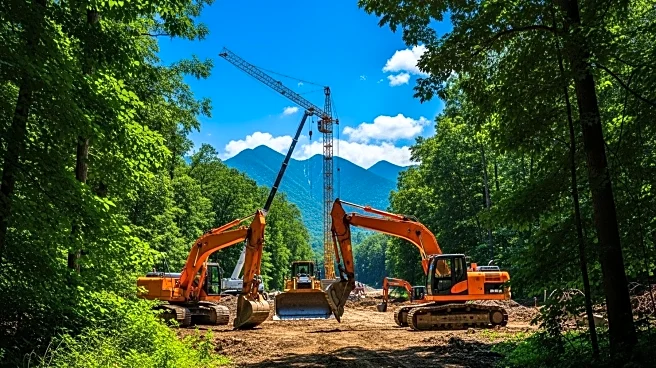What is the story about?
What's Happening?
The construction industry is grappling with significant challenges related to environmental remediation and legal compliance. A recent report highlights the importance of Phase 1 and Phase 2 environmental assessments in determining the presence and extent of contamination on construction sites. These assessments are crucial for identifying potential environmental liabilities before purchasing or leasing property. The report emphasizes that new property owners must adhere to any imposed property restrictions to mitigate exposure risks. Additionally, the construction sector is dealing with issues such as contractor licensing, cyber fraud, and the impact of tariffs. A notable case from the Georgia Court of Appeals underscores the necessity of ensuring contractors are licensed, as failure to do so can void construction loans. Furthermore, the industry is a frequent target of cyber fraud due to the high volume of electronic funds transfers, necessitating robust cybersecurity measures.
Why It's Important?
These developments have significant implications for the construction industry, affecting financial liability, project timelines, and regulatory compliance. Environmental assessments help prevent future liabilities, allowing new owners to avoid responsibility for pre-existing contamination. Legal compliance, particularly regarding contractor licensing, is critical to securing financing and avoiding legal disputes. The prevalence of cyber fraud highlights the need for enhanced cybersecurity protocols to protect financial transactions. Additionally, tariffs are impacting construction costs, prompting industry stakeholders to adapt by diversifying sourcing methods and revising contract language. These challenges underscore the need for strategic planning and risk management to ensure project success and financial stability.
What's Next?
The construction industry is likely to see increased emphasis on environmental due diligence and legal compliance. Stakeholders may engage more proactively with regulators to streamline permitting processes and avoid project delays. The industry may also invest in advanced cybersecurity measures to safeguard against fraud. As tariffs continue to affect costs, construction firms might explore alternative sourcing strategies and contract adjustments to mitigate financial risks. Ongoing legal cases and regulatory changes will shape industry practices, necessitating continuous adaptation and compliance efforts.
Beyond the Headlines
The focus on environmental remediation and legal compliance reflects broader societal and regulatory trends towards sustainability and accountability. As environmental concerns gain prominence, construction projects may face stricter scrutiny and higher standards for environmental protection. Legal compliance, particularly in contractor licensing and cybersecurity, will remain critical as the industry navigates complex regulatory landscapes. These developments could lead to long-term shifts in industry practices, emphasizing sustainability, transparency, and resilience.

















